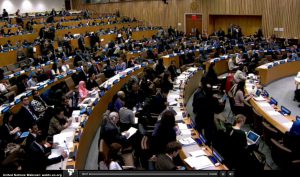FREE FLOW OF INFORMATION
An article from Prensa Latina
The Third Committee of the UN General Assembly has adopted today [November 18] by large majority two draft resolutions submitted by Cuba, which advocate for the right to peace and reject the use of mercenaries.

The text of the Declaration on the Right to Peace was supported by 116 countries, 34 rejected it and 19 abstained, following a vote requested by the United States, despite Cuba’s call to adopt it by consensus, considering the importance of the issue for humanity.
As usually occurs here, given the marked difference in positions between the North and the South, the document has been supported by the nations of Africa, Latin America and the Caribbean and Asia. Australia, Canada, the United States, Israel, Japan, New Zealand, South Korea and the members of the European Union were opposed.
The initiative states that all people should enjoy the right to peace, in order to guarantee human rights and development, without exclusion.
It also calls on the States to respect, implement and promote equality, justice and non-discrimination; and defend tolerance, dialogue, cooperation and solidarity.
Several countries co-sponsored the text submitted by Cuba, among them Belarus, Bolivia, China, Colombia, Egypt, Ghana, Indonesia, Nicaragua, Syria, South Africa, Venezuela and Vietnam.
Cuba’s project has been already adopted at the Human Rights Council in Geneva in July, when the international community was called for the first time to declare the existence of the right to peace on a planet scourged by wars, conflicts and crises, which cause suffering to tens of millions of human beings.
The Cuban delegation defended in the vote the right of all inhabitants of the planet to live without the impact of the scourge of war.
[The other] draft resolution introduced by Cuba, with the co-sponsorship of Angola, Belarus, Bolivia, China, Chile, Ecuador, India, Nicaragua, Nigeria, Syria, Uruguay, Venezuela and other States, obtained 117 votes for, 51 against and 5 abstentions.
Cuba has presented a similar initiative every year at the Third Committee.
Both projects will be submitted next month to the decision of the UN General Assembly, in the context of its 71st Session.
(Click here for an article in Spanish)
What is the United Nations doing for a culture of peace?
[Editor’s note: Here is information about the anti-mercenary resolution, drawn from the UN website: In other action, the Committee approved a draft resolution on the use of mercenaries as a means of violating human rights and impeding the exercise of the right to self-determination, by 117 votes in favour to 50 against, with 6 abstentions. Among other things, it would have the General Assembly call upon States to take legislative measures to ensure that territories under their control were not used for — and their nationals did not take part in — the recruitment, assembly, financing, training, protection or transit of mercenaries. Slovakia’s representative, speaking for the European Union, explained that the bloc had voted against the draft because it would add private security firms to the mandate of the Human Rights Council’s Working Group on those issues.]